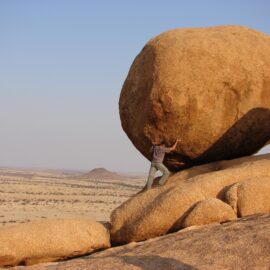
Do you want to know how to achieve balance in life? What types of breaks should you take to improve productivity?
In Attention Span, Gloria Mark disputes the idea that constant productivity is a worthy goal. Instead, she advocates a balance between periods of deep concentration, more “mechanical” tasks, and breaks to let your mind recharge.
Discover the three skills that you should practice to achieve balance: self-awareness, planning your time, and self-moderation.
1. Self-Awareness
To begin her advice on how to achieve balance in life, Mark suggests that you learn your mind’s natural rhythm—when does your ability to concentrate go up and down throughout the day? This is different for each person, despite what our assigned work schedules might suggest. Some people concentrate best in the morning, while others find it easiest later in the day or at night. Also, which weekday it is makes a difference—some of us are more productive on Monday, while others need several days to ramp up. Once you figure out your personal rhythm, you’ll be able to schedule your high-concentration projects for the times when you have the most energy to spend.
(Shortform note: Mark directs readers to online tests that help determine your mental energy rhythm, but you can also take a more methodical approach. In The Productivity Project, Chris Bailey spent three weeks charting his energy levels hourly from 6 A.M. to 9 P.M. He also cut stimulants like alcohol and caffeine, varied his workout times, consumed little sugar, and woke up without an alarm. His results revealed his body’s natural highs, lows, and what he referred to as his “Biological Prime Time,” the time in which he had the most energy to use.)
However, Mark also suggests that you take the time to consciously observe your daily activities and ask how important they are. Are you wasting time on things that don’t contribute to your overall goals? Do you gain something from your time on social media, or do you simply check it out of habit? You may find that some of the “mindless” things you do bring you joy and replenish your energy, while some of the “important” things you do aren’t providing a return on your mental investment.
(Shortform note: Mark’s advice to evaluate everything in your schedule may seem daunting, but in Essentialism, Greg McKeown fleshes it out in more detail. He says to begin by exploring the wide range of options you could be pursuing, determining which are most important based on your personal goals, and eliminating the rest. Rather than trying to do this all at once, McKeown suggests you make this kind of reflection an automatic part of your routine—this allows you to remove inessentials from your life as they crop up. What Mark might add to McKeown’s system is a reminder that rest and relaxation are essential, not something to be discarded.)
2. Planning
Mark writes that once you’ve figured out the patterns of your concentration and decided which tasks are most productive, you can design your day to optimize your cognitive resources instead of just scheduling tasks. This includes incorporating “downtime”—periods of rest or easy activities that help replenish your mental capacity. For instance, if your plan includes spending two hours working on an urgent report, perhaps schedule a long lunch or a walk in the park immediately after instead of planning to plow straight ahead into a meeting or a huge stack of emails.
(Shortform note: The mental down time Mark talks about doesn’t have to be idle—physical activity restores the mind too. In Energize, Simon Alexander Ong emphasizes that physical exercise releases mood-lifting hormones that increase your overall energy. However, exercise won’t lift your spirits if it’s something that you dread, so it’s important to find forms of exercise that you actually like. Ong recommends that you give yourself a variety of exercise options to choose from, and also that you make exercise a can’t-skip part of your daily routine.)
Mark also stresses that when planning your day, you should consider the emotional impact of your to-do list. While some tasks are uplifting, others can bring you down, even if they don’t require a lot of mental energy. For instance, if you have to make a brief but unpleasant phone call, schedule a pleasant reset before your next assignment. In other words, don’t just think about what you want to accomplish for the day—plan for how you want to feel at the end of it. You’ll be able to maintain your attention better if you strategically intersperse things you like to do around the things you dread.
(Shortform note: Though Mark is largely talking about how to lessen the negative impact of spending attention on things you dislike, the flipside is that you should prioritize things you enjoy—not just at work, but outside of it as well. In Indistractable, Nir Eyal insists that you should schedule regular time with your children, your partner, and your friends. Without maintenance, your relationships easily dissipate, so your plans with friends and family need to be regular, set events in your schedule, not simply to-do list items. If you make this time commitment, it can provide just the emotional boost Mark argues you need.)
3. Self-Moderation
The final piece to the puzzle of taking control of your attention is to learn how to gently steer yourself back when you’ve lost focus. While there are digital apps that can help, such as programs that limit internet access or timers that restrict your email usage, Mark is leery of these since they’re a crutch that prevents you from learning real self-control. Instead, she recommends learning to resist your urges to switch from task to task by reminding yourself how much better you feel when you see things through to completion.
(Shortform note: Mark’s advice on how to restore your focus relies on positive self-messaging, but many of us are more likely to hear a negative “inner critic” scolding us for getting off track. In Why Has Nobody Told Me This Before?, Julie Smith says you can silence this inner critic by learning to be kind and compassionate to yourself. If this is difficult, Smith recommends journaling, going to therapy, and talking to loved ones as ways to get to know yourself better. Once you can embrace every aspect of yourself, even the parts that give in to distraction, you can work on turning down the volume on your inner critic’s voice.)
Mark also suggests that you can plant triggers to bring you out of distracting behaviors. For instance, if you plan to take a break by playing games on your phone, you can schedule it for 10 minutes before you have to leave for an important meeting. That way, you still get the recharge from relaxing without being lured into the endless, wasteful spiral of “one more minute on this game.” In other words, if you plan time to recharge, build an on-ramp back into your schedule to help you fight the urge to be unproductive.
(Shortform note: A slightly different approach to break you out of fun, unproductive time is to make work itself enjoyable by gamifying it in some way. In Feel-Good Productivity, Ali Abdaal says to do this by asking yourself, “If your life were a video game, how would you approach it?” Would you challenge yourself to find the most efficient way to complete each “quest,” seek out opponents for the thrill of competition, or simply enjoy exploring new ideas? People spend hours playing video games because they’re designed to hold your attention. Abdaal says that if you bring a gaming mindset to work, your job can captivate you in the same way —in effect, doing what Mark suggests by distracting you from unproductive distractions.)
In conclusion, Mark emphasizes that while you can’t remove every distraction, you can engage your limited attention more wisely. Computers, the internet, and smartphones aren’t going away, and though they were intended to enhance our capabilities, they often exhaust and distract us instead. Nevertheless, Mark insists that we’re still at the dawn of the digital age, and she’s optimistic that we still have the power to shape it. Suppose you take back the power to direct your attention and balance your overall cognitive load as you navigate the digital world. In that case, you can lead a mentally healthier life without sacrificing productivity and creativity.
(Shortform note: Though Mark says it’s futile to try to remove all digital interruptions from your life, in Make Time, Jake Knapp and John Zeratsky suggest a variety of ways to do precisely that, such as deleting most of the apps off your phone, strictly limiting your email use, and heavily curtailing your TV time. Knapp and Zeratsky stress that you should be intentional about how you use technology, especially when it comes to phones and computers, so that it serves you and not the other way around.)






